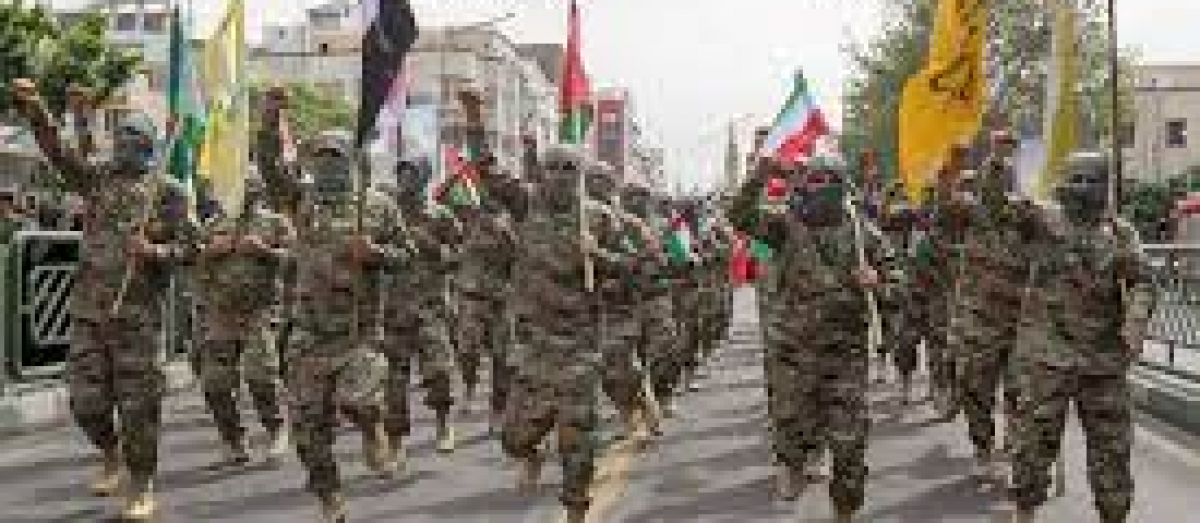Definition of Proxy War:
A proxy war is a conflict where two opposing countries or groups support combatants that serve their interests instead of waging war directly against each other. These proxy forces are armed, funded, and often directed by external powers to achieve strategic objectives without direct military engagement.
Introduction:
Proxy wars have long been a feature of the Middle East, characterized by external powers supporting local factions to advance their own interests. These conflicts not only exacerbate regional tensions but also contribute to instability, humanitarian crises, and the perpetuation of violence.
Iranian Proxies in the Region:
Iraq:
Iran’s influence in Iraq is manifested through support for various Shiite militia groups, such as the Popular Mobilization Forces (PMF), Badr Organization, Asa’ib Ahl al-Haq (AAH), and Kata’ib Hezbollah (KH). These groups, while not directly controlled by Iran, receive significant backing from Tehran, including weapons, training, and funding. They align with Iran’s geopolitical interests and have been involved in fighting against Sunni extremist groups like ISIS. Additionally, Iran supports Shiite political factions like the Islamic Supreme Council of Iraq (ISCI) and the Fatah Alliance, further extending its influence in Iraqi politics.
Yemen:
In Yemen, the Houthi rebels (Ansar Allah) are widely regarded as Iranian proxies. Iran provides the Houthis with weapons, training, and financial assistance, enabling them to challenge the internationally recognized Yemeni government and the Saudi-led coalition. The conflict in Yemen has escalated into a proxy war between Iran and Saudi Arabia, with devastating humanitarian consequences for the Yemeni population.
Syria:
Iran’s support for the Assad regime in Syria has been instrumental in propping up the government during the ongoing civil war. Iran backs Syrian government forces through military advisors, financial aid, and Shiite militia fighters, including Hezbollah. This support has allowed Assad to maintain his grip on power despite years of conflict and international pressure.
Lebanon and Gaza Strip:
Hezbollah, a Shiite militant group based in Lebanon, serves as a proxy for Iran in the Levant. Iran provides Hezbollah with significant support, including funding, weapons, and training. Hezbollah has engaged in conflicts with Israel and has been involved in the Syrian Civil War, furthering Iran’s regional objectives. Additionally, Iran supports Palestinian militant groups like Hamas in the Gaza Strip, providing them with financial and military assistance to challenge Israeli dominance in the region.
U.S. Involvement:
While the United States doesn’t typically employ proxies in the same way as Iran, it has supported certain groups in the region for strategic purposes. For example, the Syrian Democratic Forces (SDF) in Syria has received extensive support from the U.S. and its allies in the fight against ISIS. The SDF, primarily composed of Kurdish, Arab, and Assyrian/Syriac fighters, has been a key player in the conflict, although its ties to Kurdish groups like the YPG have strained relations between the U.S. and Turkey.
Conclusion:
Proxy wars in the Middle East illustrate the complex web of alliances, rivalries, and geopolitical interests that shape the region’s dynamics. External powers, particularly Iran and Saudi Arabia, exploit local conflicts to further their own agendas, exacerbating instability and humanitarian crises. Addressing these proxy wars requires concerted efforts to de-escalate tensions, promote dialogue, and address the underlying grievances driving conflicts in the region. Failure to do so risks perpetuating violence and instability with far-reaching consequences for the Middle East and beyond.




